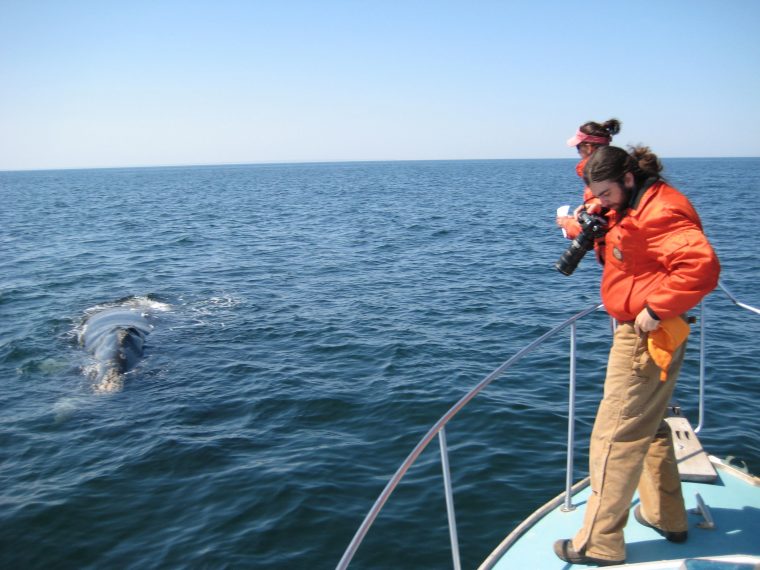Please note: We strongly recommend purchasing tickets online in advance to guarantee entry, as we do sell out on weekends.

BOSTON, MASS. (Sept. 9, 2021) – With the Gulf of Maine experiencing the most rapid increase in temperature than any other body of water in the world in the last five years, scientists are looking closely at the impact on ocean animals, such as the critically endangered North Atlantic right whale, and other species. The New England Aquarium’s Dr. Daniel E. Pendleton, a research scientist who studies species’ movement patterns, has been involved in two recent studies and penned a scientific essay observing how animals are adapting to climate change—a harbinger for humans.
The work by Pendleton, who works in the Aquarium’s Anderson Cabot Center for Ocean Life, and his colleagues resonates even more following last month’s dire “Climate Change 2021: The Physical Science Basis” report by the Intergovernmental Panel on Climate Change (IPCC) which finds that climate change is “widespread, rapid, and intensifying” across the globe, affecting sea level rise, air quality, and global temperatures.
In a joint essay in the scientific journal Oceanography, Pendleton and Dr. Andrew J. Pershing, Director of Climate Science at Climate Central and an Adjunct Scientist/Former Chief Scientific Officer at the Gulf of Maine Research Institute, discuss the challenges that right whales face as the climate changes. Right whales must adapt to a decline in food resources in their traditional habitats while those resources increase in new habitats. Their essay also analyzed a study about North Atlantic right whales migrating more frequently from the Gulf of Maine to colder waters in the Gulf of St. Lawrence in search of their main food source, copepods. In addition to the effects of fishing gear entanglements and ship strikes, the low birth rate of right whales suggests that the species is struggling to find enough food. There are only about 350 individual North Atlantic right whales remaining.
“The right whale’s specific story is not simple, and there are many parallels between right whales and people as we both struggle to adapt to climate change,” they wrote. “Just like the whales who have moved and will likely have to keep moving, our climate change adaptation will be an ongoing process. Just as the whales are struggling to learn to forage in a new environment, there will be costs to every adaptative step we take.”
In another scientific journal, Elementa: Science of the Anthropocene, Pendleton and a team of 13 scientists, led by Pershing, investigated expected changes in the Gulf of Maine by 2050 with temperatures predicted to rise by 1.1 to 2.4 degree Celsius. In the 18-page study, they found that warming waters have already been associated with a decline in zooplankton with impacts on Atlantic cod, American lobster, Atlantic puffins, and North Atlantic right whales. By using ocean models to create conditions expected by 2050, the researchers found that surface salinity would decrease, leading to water column stratification and more declines in American lobster and Atlantic cod.
More southern species—such as black sea bass, summer flounder, and longfin squid—are expected to move northward in response to rising temperatures so they could be more prevalent by 2050. Spiny dogfish and silver hake are among those species that could also expand into the Gulf of Maine. This could influence the commercial and recreational fishing markets as well, the authors suggested.
In a second 16-page study, also for Elementa: Science of the Anthropocene, Pendleton joins six other authors, including New England Aquarium Associate Scientist Monica A. Zani, to look at “Projecting regions of North Atlantic right whale, habitat suitability in the Gulf of Maine for the year 2050.” The study, led by Camille Ross of Bigelow Laboratory, projected changes to right whale habitats by the year 2050, under a range of climate change scenarios. This research will help to create adequate conservation and protection plans for the critically endangered species. In addition to the mounting risks of entanglement and ship strikes, climate change impacts such as warming waters are likely to reduce their food supply and alter their migration patterns.
“These studies give us particular insights into how we think rising ocean temperatures in the Gulf of Maine could affect vital marine life by the middle of this century,” said Pendleton. “Many of these species such as cod and lobsters also impact this important marine region from a conservation, economic, and commercial perspective. This scientific research should help us prepare for future changes.”
MEDIA CONTACT:
Pam Bechtold Snyder – psnyder@neaq.org, 617-686-5068
